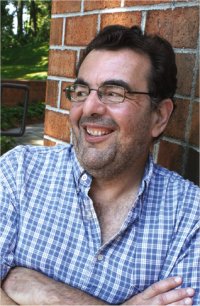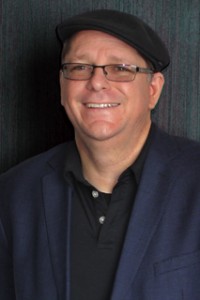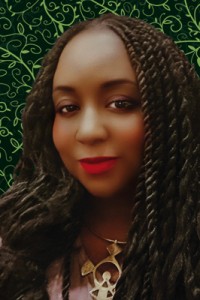Paul Di Filippo: Chameleon
 Paul Di Filippo was born in Woonsocket RI. After graduating from high school in 1972, he spent time in Hawaii, where he began seriously trying to write. In 1973 he returned to the mainland to attend Rhode Island College, Providence, where he studied English and worked part-time until deciding to go traveling in Europe in the summer of 1979. Upon his return he received computer training, becoming a COBOL programmer, and worked in computers and as a clerk at Brown University Bookstore, taking breaks to write while living off his savings, until 1994, when he became a full-time writer.
Paul Di Filippo was born in Woonsocket RI. After graduating from high school in 1972, he spent time in Hawaii, where he began seriously trying to write. In 1973 he returned to the mainland to attend Rhode Island College, Providence, where he studied English and worked part-time until deciding to go traveling in Europe in the summer of 1979. Upon his return he received computer training, becoming a COBOL programmer, and worked in computers and as a clerk at Brown University Bookstore, taking breaks to write while living off his savings, until 1994, when he became a full-time writer.
Di Filippo sold first story ‘‘Falling Expectations’’ (a parody of the work of Barry Malzberg) to UnEarth in 1977, but didn’t actively pursue writing for another few years. In 1985 two stories appeared – ‘‘Rescuing Andy’’ for Twilight Zone and ‘‘Stone Lives’’ for F&SF – the first of well over 100 published stories (and counting). Notable short works include Nebula nominees ‘‘Kid Charlemagne’’ (1987) and ‘‘Lennon Spex’’ (1992), BSFA winner ‘‘The Double Helix’’ (1994), World Fantasy Award finalist ‘‘Karuna, Inc.’’ (2001), Grand Prix L’Imaginaire winner ‘‘Sisyphus and the Stranger’’ (2004), and Sidewise Award finalist ‘‘Yes, We Have No Bananas’’ (2009).
His first book was collection The Steampunk Trilogy (1995), followed by collection of linked stories Ribofunk (1996) and SF collection Destroy All Brains! (1996). In 1997 his first novel, Ciphers, appeared, as did World Fantasy Award-nominated collection Fractal Paisleys. Next came collection Lost Pages (1998), novel Joe’s Liver (2000), collection Strange Trades (2001), and two mysteries co-written with Michael Bishop as ‘‘Philip Lawson’’: Would It Kill You to Smile (1998) and Muskrat Courage (2000). In 2002 he published four books: collections Babylon Sisters and Other Posthumans and Little Doors, erotic near-future fantasy novel A Mouthful of Tongues, and fantasy novella A Year in the Linear City, a Hugo, Sturgeon, and World Fantasy Award finalist. Novel Fuzzy Dice appeared in 2003; collection Neutrino Drag appeared in 2004, along with economic SF novel Spondulix and fantasy Harp, Pipe, and Symphony; collection The Emperor of Gowanaland was published in 2005; tie-in novel Creature from the Black Lagoon: Time’s Black Lagoon and collection Shuteye for the Timebroker came out in 2006, along with Plumage from Pegasus (the latter collecting his humor columns from F&SF); experimental novel Cosmocopia appeared in 2008; collection Harsh Oases in 2009; literary noel Roadside Bodhisattva in 2010; and collection After the Collapse and novella A Princess of the Linear Jungle (an homage to Edgar Rice Burroughs and sequel to A Year in the Linear City) in 2011. Di Filippo is a prolific book reviewer, writing for Asimov’s, The Washington Post, and other publications. He has also written for comics.
He lives in Providence RI with Deborah Newton, his partner since 1976.
Excerpts from the interview:
 ‘‘Like all writers, my own voice is a composite of everything I’ve read and everything I’ve loved, plus unique bits from my own life and career. I used to write in the styles of other authors I like a lot more than I do now. Lately I’ve gotten away from that. But I did have kind of a chameleon writing persona. Based on the idea or the characters involved, any story suggested equivalent past stories that I would then try to homage or pastiche. Dick Lupoff identified this very problem. He thought it was true of his own career, that he had bopped around among so many different styles and pastiches that his identity as a unique writer was lost in the shuffle.”
‘‘Like all writers, my own voice is a composite of everything I’ve read and everything I’ve loved, plus unique bits from my own life and career. I used to write in the styles of other authors I like a lot more than I do now. Lately I’ve gotten away from that. But I did have kind of a chameleon writing persona. Based on the idea or the characters involved, any story suggested equivalent past stories that I would then try to homage or pastiche. Dick Lupoff identified this very problem. He thought it was true of his own career, that he had bopped around among so many different styles and pastiches that his identity as a unique writer was lost in the shuffle.”
…
‘‘For short fiction, the rewards are so immediate and intense. Not fiscally, but the thrill of finishing a piece – especially in this era of electronic submission, where you get it out there, 24 hours later (if you’re lucky) it’s accepted, and a week later it’s online. That is so stimulating, it’s hard to resist. Maybe my thoughts just do turn towards the shorter works, though I’ve got a novel in progress.
‘‘I do have ideas that require the novel format. My latest two books from Pete Crowther’s PS Publishing may illustrate the range that I hope to encompass. A Princess in the Linear Jungle is the sequel to A Year in the Linear City (I finally did it!). That’s a very weird, Burroughsian… I won’t say ‘planetary romance,’ but it’s very pulpy, plot- and setting-oriented. I have to thank Pete for taking the other one, Roadside Bodhisatva, because it’s totally a mimetic novel about a runaway kid and his adventures on the road. I wrote it just to prove to myself that I could write something totally naturalistic. I will never be a mimetic writer full-time, because it felt like having one hand tied behind your back.”
…
 ‘‘This novel that I’ve got in progress is called Up Around the Bend is a weird, timeslip, utopian, alien erotic novel (it’s got a lot of the things that I like to write about in it). It has a kind of High 1970s motif, but it’s really warped. It starts out post-apocalypse, so you know that it’s science fiction. It seems like the apocalypse starts in 1972, but how can it be 1972 and 2011 and post-apocalypse all at the same time? Hopefully, there’s a rationale that makes sense eventually.”
‘‘This novel that I’ve got in progress is called Up Around the Bend is a weird, timeslip, utopian, alien erotic novel (it’s got a lot of the things that I like to write about in it). It has a kind of High 1970s motif, but it’s really warped. It starts out post-apocalypse, so you know that it’s science fiction. It seems like the apocalypse starts in 1972, but how can it be 1972 and 2011 and post-apocalypse all at the same time? Hopefully, there’s a rationale that makes sense eventually.”
…
‘‘My other current project is a non-fiction thing called The 101 Best Science Fiction Novels, 1985 to 2010, coauthored with Damien Broderick. I still think of him as the senior partner, because he’s a little older than me and has been doing them even longer. Each book has 800 to 1200 words of essay attached to it. I did 50 and Damien did 51 (that’s why he got senior-partner credit). It’s some of what the field accomplished during the last 25 years, though I haven’t quite drawn any conclusions yet. If you look at what we’ve done over the last 25 years, it is amazing. By and large, the readers can find whatever they want to.”






